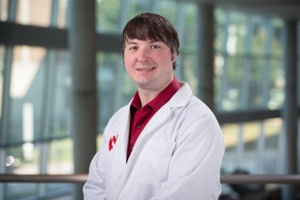- Residency
- Welcome
- Program Details
- Curriculum
- Rotations
- Autopsy
- Bone Marrow
- Clinical Chemistry
- Clinical Microbiology
- Community/Private Practice
- Cytogenetics
- Cytopathology
- Flow Cytometry
- Lymph Nodes
- Molecular
- Neuropathology
- Surgical Pathology
- Transfusion Medicine
- Transplant
- Wet Heme
- Conferences
- Salary & Benefits
- Facilities and Resources
- Residency FAQs
- Teaching and Research Opportunities
- Health Educators and Academic Leaders (HEA
- Residency Events
- Apply
- Current Residents
- Alumni
- Fellowships
- Awards and Accomplishments
- Contact
- Medical Students
- Related Resources
- About UNMC and Omaha
The duration of Wet Heme rotation is 4 weeks, with the final week focused on Coag experience. During this rotation, the resident will gain knowledge in interpreting hematological and coagulation testing data, evaluating peripheral blood smears and body fluids, investigating significant abnormal results in the hematology and coagulation laboratories and providing consultative guidance to clinicians. The resident will also gain knowledge in the modern concepts of hematopoiesis and coagulation, and recognize normal and neoplastic hematopoietic cells.
A Resident's day-to-day on the Wet Heme Rotation
The wet heme rotation is typically structured for the first year resident to get started with the basis of Hematopathology. Resident responsibilities include studying peripheral blood smears to understand normal morphology of blood cells and any deviation from normal. We get to preview a spectrum of non-neoplastic disorders like hemoglobinopathies, nutritional deficiency, infections to neoplastic hematolymphoid malignancies. Following resident-preview in the morning, cases are signed out in the afternoon with active faculty teaching. This is coupled with attending bone marrow sign outs, which focus on important morphologic parameters of myeloid/lymphoid/megakaryocytic lineage maturation and associated aberrancy.
Additionally, residents spend dedicated time at the core hematology lab, bone marrow lab and biopsy clinic to mechanistically study hematological tests and sample processing. The rotation is scheduled for four weeks.

Jeffrey "John" Cannatella, MD
- Residency
- Welcome
- Program Details
- Curriculum
- Rotations
- Autopsy
- Bone Marrow
- Clinical Chemistry
- Clinical Microbiology
- Community/Private Practice
- Cytogenetics
- Cytopathology
- Flow Cytometry
- Lymph Nodes
- Molecular
- Neuropathology
- Surgical Pathology
- Transfusion Medicine
- Transplant
- Wet Heme
- Conferences
- Salary & Benefits
- Facilities and Resources
- Residency FAQs
- Teaching and Research Opportunities
- Health Educators and Academic Leaders (HEA
- Residency Events
- Apply
- Current Residents
- Alumni
- Fellowships
- Awards and Accomplishments
- Contact
- Medical Students
- Related Resources
- About UNMC and Omaha

